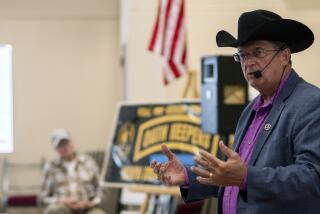U.S. Further Revises ‘No Child’ Law
The Bush administration on Monday announced additional revisions to the No Child Left Behind Act, the controversial education initiative that has been assailed for imposing strict testing requirements on the nation’s public schools.
The new policy will make it easier for rural teachers, science teachers and teachers of multiple subjects to be considered “highly qualified,” thus meeting a requirement of the law that all public school teachers of core subjects -- such as math, English, history and science -- achieve that standard.
Monday’s action marks the third time since December that the Education Department has announced changes to No Child Left Behind, which establishes broad federal testing requirements for elementary and middle schools and became law two years ago with much bipartisan fanfare. Since then, however, conservatives have blasted what they call a big-government approach to education reform, liberals have railed against what they term inadequate funding for compliance, and state legislatures across the country have rebelled against the law, which uses federal funding as an incentive for schools to measure progress in meeting defined standards.
As part of those standards, teachers of core subjects must be designated highly qualified by the 2005-06 school year -- meaning they must have bachelor’s degrees and teacher certification. They also must have demonstrated knowledge of the subjects they teach.
Monday’s announcement gives rural teachers, who may be highly qualified in one subject but teach others as well, three additional years to qualify in the other topics they teach. It gives states the flexibility to give science teachers a broad “science” qualification, rather than requiring a specific qualification for biology, chemistry and physics. And it gives states the authority to determine that veteran teachers are highly qualified in multiple subjects without going back to school or getting additional degrees.
The changes reflect the difficulties schools across the country are facing, particularly in rural and low-income areas, as they try to comply with the new federal standards, education officials said. They do not require congressional approval.
“We listened to educators from across the country, and we learned,” Education Secretary Rod Paige said. “Today we are responding with changes that make sense, supporting state efforts to strengthen teacher quality and aiding the professionals in the classroom.”
In California, which has more than 1,400 schools in rural areas that employ 24,975 teachers and serve 472,000 students, educators welcomed the new flexibility for rural schools. These isolated campuses often struggle to fill openings, requiring some of their instructors to double up on the subjects they teach.
At Taft Union High School, about 120 miles north of Los Angeles, Principal William Wickwire has been unable to find enough teachers to handle all of his classes. Four of his 55 instructors now teach multiple subjects with special permission from the local school board.
One longtime teacher, who holds a credential in physical education, also teaches U.S. history; another teacher, who has a social science credential, also teaches English.
Wickwire had worried about his school’s ability to comply with the No Child Left Behind law. Now he thinks the campus of 900 students will make it.
“It will allow me time to make sure all of my teachers are fully credentialed in all the areas they teach,” he said. “Given the time, I’ll get them there.”
California education experts said about 10% of the state’s teachers do not yet possess all of the qualifications to be considered highly qualified under the state’s rules. But state education officials praised their federal counterparts for loosening up the law’s requirements.
“The new policies for implementing No Child Left Behind show a welcome recognition by the U.S. Department of Education that flexibility is needed to make this law work in the best interests of our children,” Jack O’Connell, the state superintendent of public instruction, said in a statement.
The changes announced since December gave schools greater flexibility in how they monitor the progress of both children in special education classes and children who are learning English as a second language. Schools run the risk of state and federal sanctions if their students do not show ongoing progress on standardized tests.
Even many of the administration’s critics said the recent changes were in the right direction, but they stressed that the law still has many flaws.
“There are absurd things about the law that need to be changed,” said Daniel Kaufman, a spokesman for the National Education Assn., a union that represents 2.7 million teachers nationwide. “The administration has made a dent into the mountain of confusing and illogical provisions in the law.”
But some school administrators said that Monday’s announcement did not seem like anything new.
“Some states are already doing these things,” said Patricia Sullivan, deputy executive director for the Council of Chief State School Officers, which represents the top school officials in every state.
For instance, in Montana, state officials had told the Bush administration that 99.6% of their teachers were highly qualified, but the state education officials and teachers worried that the Bush administration would not agree with their assessment. In that rural state, it is common for there to be one science teacher per school district, with that individual teaching every science subject in the high school and the middle school, said Linda McCulloch, Montana’s state school superintendent.
“The most significant thing that came out of today’s announcement is that it showed that the U.S. Department of Education is listening to rural states,” McCulloch said.
*
(BEGIN TEXT OF INFOBOX)
Teacher Standards
These are some of the teacher-quality requirements of the No Child Left Behind Act:
* Every public school teacher of a core academic subject must be deemed highly qualified by the end of the 2005-06 school year. Current teachers in rural districts, however, have until the end of the 2006-07 year.
* Teachers of core subjects must be highly qualified now if they were hired after the 2002-03 year began and work in jobs supported by Title I, a federal aid program for poor students.
* Core subjects are English, reading/language arts, math, science, foreign languages, civics and government, economics, arts, history and geography.
* “Highly qualified” means that teachers must be certified or licensed to teach in their state, must hold at least a bachelor’s degree and must show mastery of subjects they teach.
* New elementary school teachers must pass a rigorous state test to show teaching skills and knowledge in reading, writing, math and other areas of basic elementary-level curriculum.
* New middle- or high school teachers must pass a test in all academic subjects they teach -- or they must hold an academic major, the coursework equivalent of a major, a graduate degree or advanced certification in all subjects they teach.
* No teachers who have temporary, provisional or emergency state certification will be considered highly qualified.
From Associated Press
*
Shogren reported from Washington and Helfand from Los Angeles.
More to Read
Sign up for Essential California
The most important California stories and recommendations in your inbox every morning.
You may occasionally receive promotional content from the Los Angeles Times.









